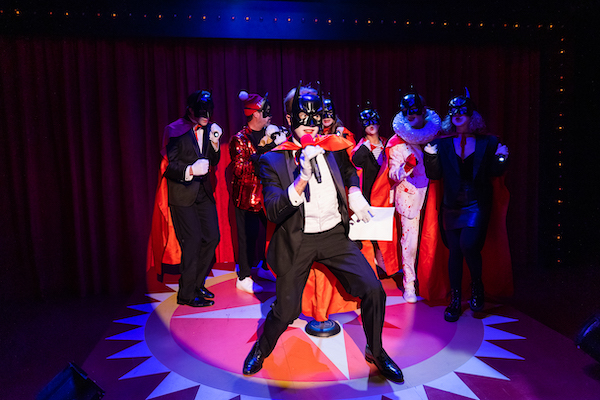Theater Review: “The Merchant of Venice” — Rebooted Marvelously
By Erik Nikander
Audiences who are open to a show that provides both riotous comedy and bracing truths will find plenty to think about in this deconstruction of one of the Bard’s most problematic problem plays.
The Merchant of Venice by William Shakespeare. Directed by Igor Golyak. Staged by Actors’ Shakespeare Project at The Plaza Theater, Boston Center for the Arts, 539 Tremont Street, Boston, MA, through October 17.

Nael Nacer as Shylock in the ASP’s The Merchant of Venice. Photo: Igor Klimov
A play is a malleable thing. How we see the most enduring works of theater can’t help but be filtered through the times. This is true of The Merchant of Venice more than most classic works of drama. The character of Shylock, the Jewish moneylender who strikes a deadly bargain with Antonio, has been re-assessed and re-interpreted like few others in Shakespeare’s canon. First portrayed (most likely) as a straightforwardly scheming villain, theatre-makers now tend to depict him as a tragic and sympathetic antagonist driven to bloody revenge after enduring a life of anti-Semitic hatred. But is this critical shift enough to counteract the vicious stereotype at the character’s core? That’s a question that director Igor Golyak and Actors’ Shakespeare Project dig deep into in their production of The Merchant of Venice, “rebooted” after a brief run pre-COVID in 2020 (Arts Fuse review). And their response is pretty successful: a gutsy re-envisioning of the Bard’s “problem play” that is both funny and heart-wrenching. What more, it confronts anti-Semitism past and present with theatrical boldness.
Golyak’s take on The Merchant of Venice often makes the script feel more like a cabaret show than one of the Bard’s dramas or comedies. Dennis Trainor’s sardonic Antonio acts as the emcee of the evening, announcing each scene, guiding the audience through the show’s twists and turns as he provides arch color commentary. “You’re welcome,” he quips after informing us that Act II, Scene I has been cut. The scenes that make the grade are presented in a kaleidoscope of theatrical styles. The clandestine meeting between Jessica (Anna Bortnick) and Lorenzo (Peter Walsh) takes the shape of a shadowy thriller, with the ensemble wearing Batman masks and humming the Mission: Impossible theme. The challenge of the caskets that Portia (Gigi Watson) poses to her wooers (Darya Denisova, who also plays Narissa) is presented with the flash and flair of a slick game show. Gobbo (Jordan Palmer) delivers a monologue like a manic stand-up comedian, fingers dancing over the keyboard slung around her neck.
This collage of storytelling styles is a powerful reminder that The Merchant of Venice can’t merely be an artifact of the Elizabethan era. Like any enduring play, it invites (in some cases demands) to be reshaped and reinterpreted as tastes and attitudes change — this production deals with that reality head-on. Nael Nacer’s Shylock is, at first, a man shackled by the stereotypical traits assigned to the Jews by a culture that feared and hated them. He hobbles about the stage in a commedia mask with a swollen nose, talking in an exaggerated accent, and constantly scheming to get one over on the Christians in the play.
This grotesque parody is uncomfortable to watch, but rather than shy away from history’s ugly caricatures, Nacer grabs them by the throat and squeezes the rancid life out of them. His commitment to the cartoon capering makes it all the more heartbreaking when the illusion cracks and we get a glimpse of the wounded, soulful man inside. Even when Nacer removes the absurd mask from his face, the other actors speak and react only to the mask, to their own preconceptions — not to the flesh-and-blood Shylock. When a spotlight descends and isolates Nacer from the rest of the cast, we can see in his eyes the emotional toll that prejudice is taking on him.
To give away too many more of the production’s stylistic flourishes would be a shame, given how visually inventive and surprising it is throughout. Nastya Bugaeva’s set design is all crimson and curtains, resembling a cross between a vaudeville stage and the Red Room from Twin Peaks. The background looks elemental at first, but it offers plenty of surprises over the course of the play. The color black dominates the costumes, which were also designed by Bugaeva — from Shylock’s shaggy fur coat to the sharp suit worn by Bassanio (Jesse Hinson). They create an antique, offbeat style that only adds to the staging’s haunting quality. Dewey Dellay’s music and sound effects work to provide each scene with a distinctive flavor, including bouncy comedic tunes as well as eerie melodies that suggest a touch of Kurt Weill. The production’s top-notch technical artistry creates an off-kilter atmosphere that only enhances the darkness in the play’s history and themes.

Peter Walsh as Lorenzo and Ensemble in the ASP production of The Merchant of Venice. Photo: Nile Scott Studios.
The performances also hint at the diseased nature of a society in which anti-Semitism festers. As Portia, Gigi Watson is by turns hilarious, sympathetic, and terrifying– she plays both dry cynicism and emotional anguish with gusto. This version of the character is still legally brilliant, but there’s a frightening instability layered underneath. She has a great sidekick in Denisova’s Nerissa, whose kooky comedic energy bounces well off Portia’s lovelorn woes. Anna Bortnick portrays Jessica as both an exasperated valley girl and a born schemer who craves the affection of Peter Walsh’s hunky Lorenzo. The play’s crisscrossing storylines engage, but they are pushed aside when the ridicule of Shylock reaches its breaking point. When Nacer’s Shylock is given a chance to right the wrongs the Christians have done to him and attack his tormentors, he takes it — the results are both disturbing and deeply poignant.
If there’s any drawback to Golyak’s thought-provoking approach, it’s that it feels somewhat torn between its need to tell the story of The Merchant of Venice and to critically assess the impact of the play. This multi-faceted quality isn’t necessarily a bad thing, of course. The metatheatrical aspects of the show are provocative and challenging. It is Golyak’s attempt to grapple with the play’s treatment of its Jewish characters in an emotionally rich way, and his efforts are by and large a success. In the process, romantic entanglements sometimes take a backseat, and that may turn off Shakespeare purists. On the other hand, audiences who are open to a show that provides both riotous comedy and bracing truths will find plenty to think about in this deconstruction of one of the Bard’s most problematic problem plays
Erik Nikander is a critic, playwright, and filmmaker based in the New England area. His film criticism can be read on Medium and his video reviews on a variety of topics can be viewed on Youtube at EWN Reviews.
Tagged: Actors' Shakespeare Project, Erik Nikander, Igor Golyak, Nael Nacer
